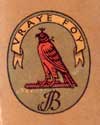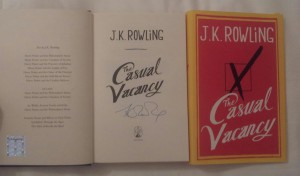Wed 12 Mar 2014
Whoa. J.K. Rowling is obviously a very popular author due to her Harry Potter series. But I just today learned of her ingenious way to thwart “signature pirates”. It seems that she has been inundated with requests for her signature since the early days of the Harry Potter series. So much so, that she no longer signs books except for charities and the like. Well, that means that unscrupulous people have sold copies of her books with forged signatures (to greatly increase their worth on the market).
To counteract this piracy, since 2007 she affixes a little hologram to the opposite page of any book she signs. I’ve never heard of this before. Neat, sorta. But it’s also sad – I rely on the word of a dealer when I buy a book that was signed. I’m still optimistic that all the signed books I have are authentic (though more than half were signed in my presence)…
The book below is an example and you can get it for a mere ~$350.00 on ABEBooks.com. That’s a steal, as a 1st edition copy of her first book, “Harry Potter and the Philosopher’s Stone” (published 1997) runs for more than $15,000.00 (with the hologram if signed after 2007).








